- Home
- Nick Carter
The Fanatics of Al Asad
The Fanatics of Al Asad Read online
Annotation
MORTAR ATTACK ON WHITE HOUSE!
PRESIDENT AND VICE-PRESIDENT ASSASSINATED!
HOUSE SPEAKER KIDNAPPED!
Four-inch headlines screamed from the front pages. There was only one way to save American democracy-find the Speaker of the House before the insane terrorists carried out their ultimate threat…
The trail of terror led to New York. Somewhere in Manhattan lurked "The Lion" — Al Asad — the name of the group of fanatics who thought they had a divine mission: terror, assassination, and international blackmail.
It was a job for one man — alone. But even when Killmaster found them, any wrong move would mean instant death for the next President of the United States!
* * *
Nick Carter
Chapter One
Chapter Two
Chapter Three
Chapter Four
Chapter Five
Chapter Six
Chapter Seven
Chapter Eight
Chapter Nine
Chapter Ten
Chapter Eleven
Chapter Twelve
Chapter Thirteen
* * *
Nick Carter
Killmaster
The Fanatics of Al Asad
Dedicated to The Men of the Secret Services of the United States of America
OCR Mysuli: [email protected]
Chapter One
Wednesday. 3:46 p.m.
The smell in the room was antiseptic, hospital clean. The walls were pale hospital green like the sheets and like the gown the doctor wore and like the one I wore, too.
He lay in a narrow hospital bed with chrome tubing at the sides to keep patients from falling out of bed. Only this patient wouldn't fall out because he was strapped down. One broad, webbed strap was across his chest and arms, another was across his thighs. The third bound his calves. All he could move was his head and eyes, which were glazed, the pupils dilated. The straps really weren't necessary. He was dying despite the IV tubing that dripped plasma into his veins.
He was a young man, no older than his mid-twenties, swarthy and strongly built.
The doctor stepped back from the bed and shook his head at me.
"I can't give him any more without killing him," he said glumly. "He's pretty far gone as it is."
"Let's take that chance. He's got to talk!"
The doctor shrugged his shoulders. "It's your decision."
I heard the patient mutter something.
"Ask him again," said Hawk. He was slumped in a chair in the corner of the room. His haggy suit was even more rumpled than usual, and he was smoking one of his foul smelling cigars in violation of all the hospital rules.
I went over to the bed, catching the young man's face in my hand, cupping it by the chin and turning it to face me. I shook it hard. The glazed eyes began to focus on me.
"What is your name?" I asked.
The mouth opened. A thin trickle of saliva ran down one corner of his mouth. I relaxed my grip so that he could move his lips.
"Ah… Ah…" he croaked.
"What is your name!"
"Ah… Ahmad," he said, still fighting to remain silent.
In the corner, Hawk grunted.
"What is the name of your organization?" I asked. Beside the bed, on the small hospital table, the cassette tape recorder spools rotated slowly. The microphone was close to his face.
"What is the name of your organization!"
I could see him try to close his mouth. The struggle was a powerful one, but he lost. Scopolamine works when you want to get the truth from someone. The drug the doctor had administered was more potent than scopolamine, but it was trickier to administer.
"Ta…" he said.
It meant nothing to me. I looked at Hawk. He shrugged his shoulders.
"…Sin…" said the young man. Tears welled up in his eyes. He knew he was talking in spite of himself.
"He's not making sense," growled Hawk.
"…Mim…" said the voice brokenly. Ahmad began to cry soundlessly.
"Chinese?" asked Hawk, puzzled.
"I doubt it," I answered. I bent down to the strapped figure. "Tell me about the organization!"
The struggle showed itself on his face. Again, he lost.
"…Su… Surah…" he muttered unwillingly.
I began to get the first faint glimmerings of an idea.
"Allah Akbar. Allah is great" I said. My Arabic has a Cairo accent.
"Bismallah," I said.
His eyes had closed. He heard only my voice.
"…Fat'hah," he answered.
I took a deep breath and a big chance. In Arabic, I began to recite what every Muslim boy learns from childhood on.
"Bismallah," I said again. "In the name of God, the Merciful, the Compassionate."
The mouth began to twist in a smile of pleasure.
"Pu… Praise belongs to God," he responded in a whisper, also in Arabic but with a Syrian accent. "The Lord of All-Being, the All-Merciful, the All-Compassionate, the Master of the Day of Doom."
Fat'hah means 'the Opening' in Arabic. It's the name of the first Surah of the one hundred and fourteen Surahs of the Quran, which we call the Koran. All but one of the Surahs, or chapters, begin with Bismallah — In the Name of God, the Merciful, the Compassionate.
But, what did it mean? Hawk and I both knew it had a meaning out of the ordinary for this terrorist the only one to survive out of the dozen who had carried out their attack successfully.
They were fanatics, young men every one of them, who knew they hadn't a chance and yet had gone ahead with the craziest plan in the world.
Only three hours before, as the Vice-President and the President of the United States had come out of the White House, blinking in the bright sun that hit the Rose Garden, a mortar shell had landed and killed them both.
They died along with three Cabinet members — one of whom was the Secretary of State — several newspapermen and most of a television camera crew. In all, four mortar shells landed in ten seconds.
In one explosion, the country's leaders had been wiped out. The Speaker of the House was now the President — and he was missing!
Twenty minutes after the event, Hawk had me sitting in his office while he spelled out the details.
And not one of the details meant a thing. There had been an explosion. Five Secret Service men had died along with the others.
The shells had been fired from a slowly moving, open-bodied Army truck. Five men in green Army fatigues rode in the back. The truck and the fatigues had been stolen from Fort Meade two days earlier. When the truck reached the intersection of Pennsylvania Avenue and 15th Street, the truck came to a halt. The men in back whipped tarpaulins from two mortars. Everything had been carefully calculated so that from that location they were sure to hit the Rose Garden. Four rounds were fired in ten seconds, the big mortar shells looping up in a high parabola to come slamming down onto the White House grounds. Almost immediately, the truck was thrown into gear and started off again.
At New York Avenue, Secret Service men blew out the tires of the truck. One rammed it with a car to immobilize it and died from the concentrated fire of the commando group's automatic rifles. When the fire fight was over, there were some forty dead, including a score of innocent passersby. Only one terrorist was still alive — the young man now dying in front of us on the hospital bed, his veins pumped with truth serum.
But, Ahmad was as good as dead. He knew it, and the knowledge seemed to please him.
"…Ta…" he muttered again.
"…Sin…" he said.
For two and a half hours, the doctors had fought to save him so that he could talk. He wanted to die. Now, Ahmad had b
eaten them.
"…Mim…" he said and died.
The doctor rushed to the bed as Ahmad's head lolled limply to one side. He slapped his stethoscope onto Ahmad's bare chest. He listened for a minute, then straightened up.
"He's gone."
Hawk rose to his feet, motioning me to follow him. I slipped the tape recorder cassette into my pocket. Together, we walked out into the corridor and down the hallway lined with Secret Service agents.
Halfway down, the head of the Presidential Detail came rushing up to us.
"Send them home," Hawk told him bluntly, before he could speak. "The man's dead."
Outside, we got into Hawk's car and drove back to the AXE office in Dupont Circle. We said nothing to each other during the entire trip.
Inside, Hawk sat wearily at his desk. I had never seen him so despondent before. He acted as if, somehow, the whole affair was his fault.
Finally, he lifted his head and stared at me.
He said slowly, "Where in the hell is the Speaker of the House? Goddamn it, hasn't he been told? Doesn't he know he's now the President of the United States?"
Angrily, he reached out for the direct line to the Oval Room. From my chair on the far side of his office, I couldn't hear what he was saying until the very end. Then his voice rose.
"…No! For God's sake, no! It's not the Russians! Get word to the Pentagon! Get them to stand down! Do you want to trigger an atomic war?"
Hawk glared at me as he listened to the voice on the other end of the line.
"Yes," he said finally, in answer to a question. "We're sure it's not the Soviets. It's an Arab terrorist group… What's that?… No, we don't have all the information yet. What I want to know is, where the devil's the Speaker of the…"
He broke off, his eyes growing slightly wider in surprise. Hawk listened for a moment — a long moment — before he gently put down the phone. With Hawk, that meant he was doing his best to control his fury.
I kept my mouth shut. Hawk would tell me if he felt I ought to know.
"They've just received a ransom note," he said, looking down at his clenched hands on the desk top. "The Speaker of the House was kidnapped at exactly the same time the President and Vice-President were killed. It's a terrorist group who calls itself 'Al Asad'…"
"…'The Lion'," I translated automatically.
Hawk paused to take out and fight one of his cheap cigars. Two matches broke off in his hand. I'd never seen him so upset.
"They promise to kill him in three days if we don't come up with their ransom demands." The strain in his voice was barely concealed. "And, I swear to God, I don't see any possible way for us to do so."
He stood up. "Let's get over to the White House, Nick."
* * *
Wednesday. 8:32 p.m. The White House.
The Israeli ambassador put the formally typed and bound folder on top of the polished mahogany of the conference table almost as if he wanted nothing more to do with it. We had been waiting several hours to get this reply, but now none of us sitting around the table made a move to pick it up. At 4:12 p.m., the ransom note from the terrorists had come in. Half an hour later, the Israeli ambassador was brought to the White House in a Presidential limousine and was informed of the contents of the note. He said nothing at the time.
Now, some four hours later, he was back again. The group was small. He looked around at us and said, somberly, "Gentlemen, this is my government's response to your request to our Premier. I conveyed it to him this afternoon. He convened a special urgent meeting of the Knesset, our Parliament. His reply has the full, unanimous backing of every member of the Knesset, I might add. There was not a single dissenting vote.
"Under no conditions will we consent to the return of arms already delivered to us by your country. As for the stoppage of arms deliveries presently agreed upon by our two countries, we would consider it a violation of the treaties that exist between us were such a thing to happen."
No one said a word. None of us had believed that the Israelis would consent to the ransom demands made by the Al Asad terrorist group, but we had had to go through the motions.
The Israeli ambassador went on. "Personally, we have found that there is only one way to deal with terrorists. Not just an eye for an eye, but retribution to a degree that makes the tactics of terror not worth it. We level an entire village that harbors terrorists! It works. Guerrilla warfare can be stopped only when you do not allow them the environment they must have in which to exist!"
General Standish, Chariman of the Joint Chiefs of Staff, spoke up. "And what is that, sir?"
"Arab terrorists follow the teachings of Mao on guerrilla warfare. 'Swim like a fish among other fish.' They breed fear among the villagers so that they can hide among them as part of them. The villagers fear us more. Any house that shelters a terrorist is razed to the ground. Reprisal, General! Swift and terrible as an avenging sword! Remember, you cannot deal logically with fanatics!"
Senator Connors, Chairman of the Senate Foreign Relations Committee, cleared his throat. "Mr. Ambassador, we're in a different situation here. The ransom note for the safe return of the Speaker of the…"
"…he's now President of the United States," interrupted John Briarly, the new head of the National Security Agency. "Let's think of him in those terms."
"You're right," said the Senator. "The terrorists hold captive the President of the United States. It's just not an ordinary citizen whose life we're talking about! Our country would be leaderless!"
"You are asking for the life of our country," the Israeli ambassador replied bluntly. "We are not prepared to sacrifice an entire nation for just one man, no matter how important he might be!"
He indicated the folder on the table.
"You tell us that the terrorist group who kidnapped your President wants one hundred million dollars in cash. I'm sure that presents no problem to your government.
"They want an end to arms shipments to our country. We tell you plainly that it would mean the total end to diplomatic relations between us.
"Finally, they want the return of all American arms that have already been sent to Israel. We answer you that these men are insane! There is no possible way for us to accede to that demand. It would leave us completely helpless to Arab attack!"
Paulson took his pipe from his mouth. The head of the CIA asked quietly, "Mr. Ambassador, has your country taken any overt action as yet?"
The Ambassador turned to him. His brown, desert-worn face carried a long scar along its left side. I knew he'd gotten it as a tank commander in the '67 war. He held the rank of Brigadier General in the Israeli Army, and had spent his entire life in defense of his country. There was regret and compassion and pity in his eyes, but there was also cold, tempered steel in them, too.
He nodded, grimly. "We have, indeed. Immediately after I informed my government of what had occurred today, and of the contents of the ransom note you received this afternoon from the terrorists, we began to arm our Pershing missiles with nuclear warheads. I'm sure it comes as no surprise to you that we've had nuclear capability for quite some time. Israel is on full, war-time alert as of this moment!"
A gasp ran around the room.
The ambassador went on, his harshly accented English making the words sound even grimmer.
"Israel is a nation of scientists and engineers. We also have long-range missiles. These, too, have been armed with nuclear warheads."
He paused, his eyes going around the room, taking in each one of us in turn.
"We would like you to let it be known to Egypt, Syria, Lebanon and Jordan that our short-range missiles are targeted on Cairo, Damascus, Beirut and Amman. As for the Russians — and we are sure that in some way they are involved in this — you may inform them that our long-range missiles, our ICBM's, are aimed at Moscow, Kiev, Leningrad and other key Soviet cities!"
We sat in silence as he went on remorselessly. "Any indication that the Americans will insist" — he accented the word — "upon carr
ying out the instructions of the ransom note will lead us to trigger these devices."
His eyes went around the room again.
In a slightly more personal tone of voice, he said, "I, myself, regret the necessity of this response, but we have no other choice. My government shares my feeling. We cannot put an end to our country, or to allow the ensuing slaughter of our people. Not for one man, gentlemen, even if he is your President! We have lost too many of our own to make one man's life so important!"
He stared at us. Almost as if lecturing, he said, "One of your own Presidents once said, in a similar situation, to the pirates of Tripoli, 'Millions for defense, not a penny for ransom!' Has America completely lost its manhood? Are you men going to capitulate to the demands of a few fanatics? If you do that, gentlemen — then, were I an American I would be ashamed of my country and its leaders! And if I were any one of you here now" — again he looked around at us — "I could never hold up my head in pride again!"
With that, he gathered up his briefcase, nodded to his attaché and stalked out of the conference room.
Hawk was the first to speak up.
"The man's right. We can't give in to them."
One by one, beginning with General Standish, each man in the room nodded his head in agreement.
Briarly, the NSA head, said, "They've given us only three days before their deadline to execute the President, gentlemen. That's not much time."
Senator Connors got to his feet. He was well over six feet in height, rangy, ruddy-faced from the wind and the western sun of his native state.
"Then, god damn it, find them!" He pointed to each man as he named the agency. "CIA! FBI! National Security! Army Counter-intelligence! Navy Counter-intelligence! There are enough of you! Find them!"
The head of NSA spoke up. "That's the assignment, gentlemen." He, too, looked around the room, as if to ask if there were any questions.
The FBI chief crushed out his cigarette.
"Who's going to run this operation?" he asked, without looking at anyone, but the tone of his voice suggested that he fully expected the FBI to be named.

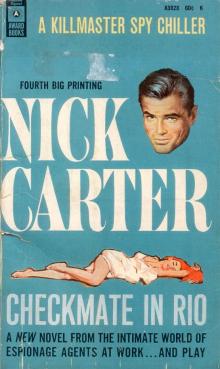 Checkmate in Rio
Checkmate in Rio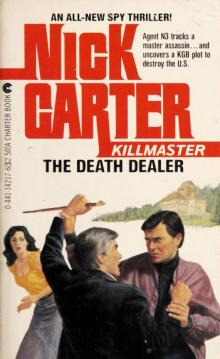 The Death Dealer
The Death Dealer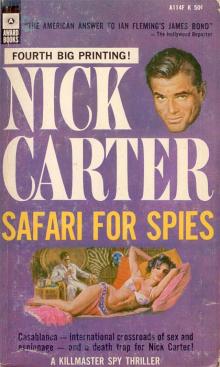 Safari for Spies
Safari for Spies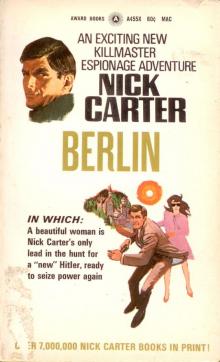 Berlin
Berlin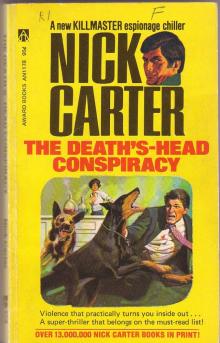 The Death’s Head Conspiracy
The Death’s Head Conspiracy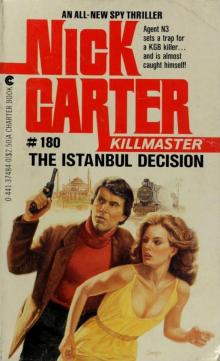 The Istanbul Decision
The Istanbul Decision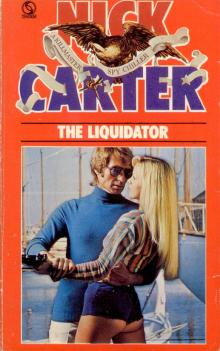 The Liquidator
The Liquidator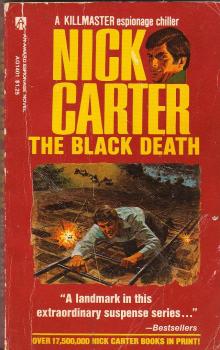 The Black Death
The Black Death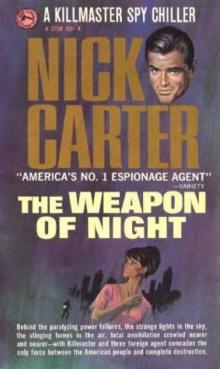 The Weapon of Night
The Weapon of Night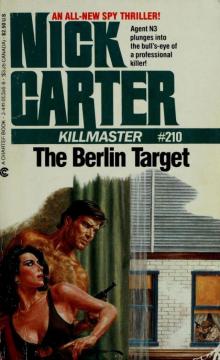 The Berlin Target
The Berlin Target Temple of Fear
Temple of Fear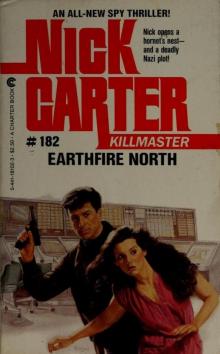 Earthfire North
Earthfire North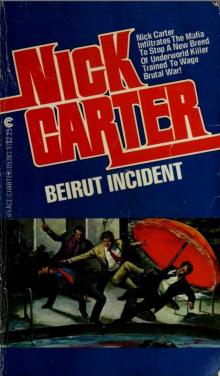 Beirut Incident
Beirut Incident White Death
White Death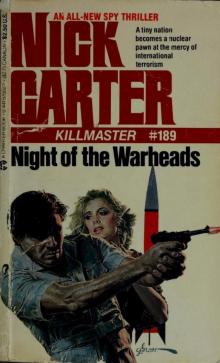 Night of the Warheads
Night of the Warheads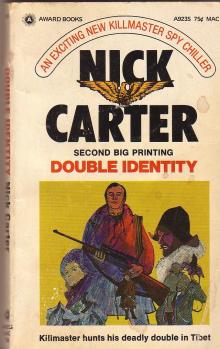 Double Identity
Double Identity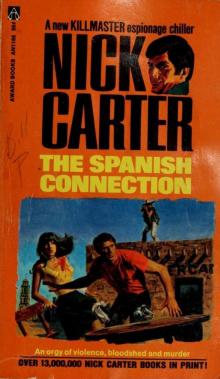 The Spanish Connection
The Spanish Connection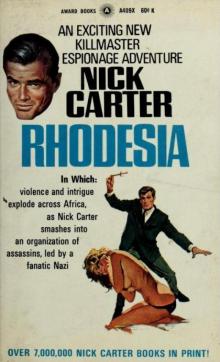 Rhodesia
Rhodesia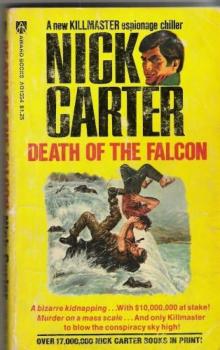 Death of the Falcon
Death of the Falcon The Executioners
The Executioners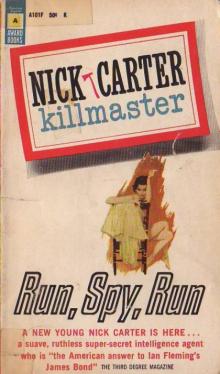 Run, Spy, Run
Run, Spy, Run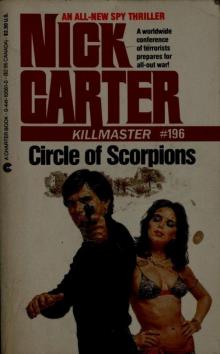 Circle of Scorpions
Circle of Scorpions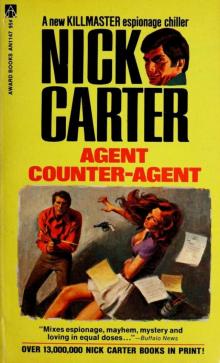 Agent Counter-Agent
Agent Counter-Agent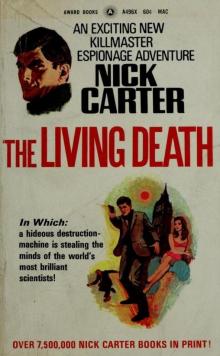 The Living Death
The Living Death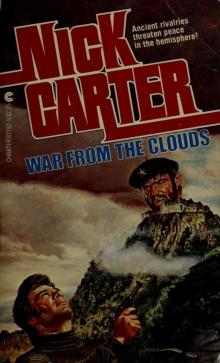 War From The Clouds
War From The Clouds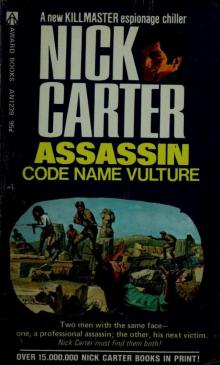 Assassin: Code Name Vulture
Assassin: Code Name Vulture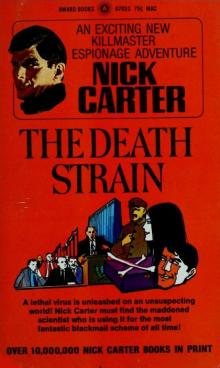 The Death Strain
The Death Strain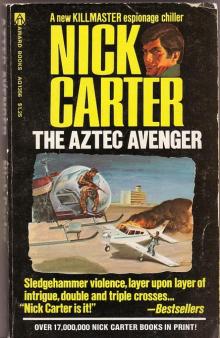 The Aztec Avenger
The Aztec Avenger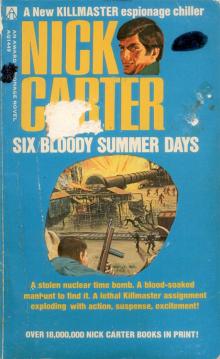 Six Bloody Summer Days
Six Bloody Summer Days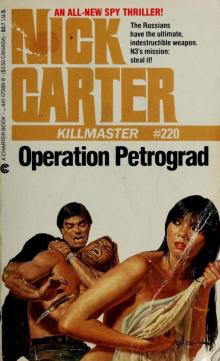 Operation Petrograd
Operation Petrograd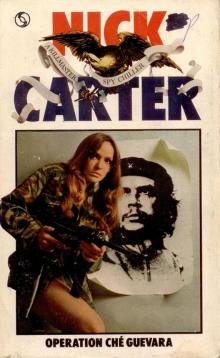 Operation Che Guevara
Operation Che Guevara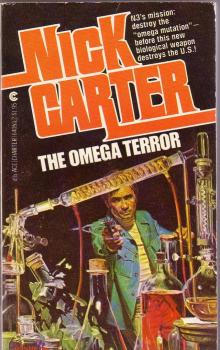 The Omega Terror
The Omega Terror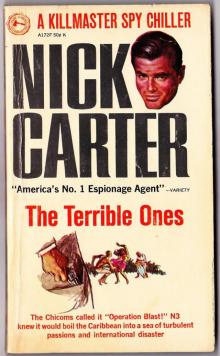 The Terrible Ones
The Terrible Ones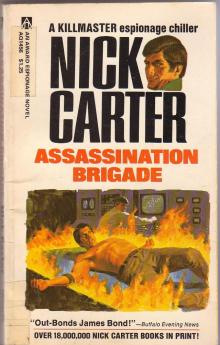 Assassination Brigade
Assassination Brigade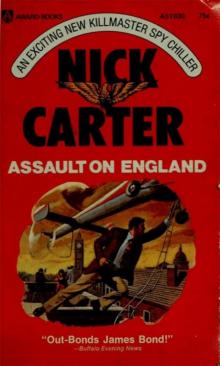 Assault on England
Assault on England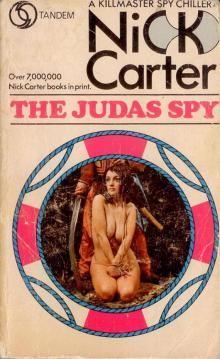 The Judas Spy
The Judas Spy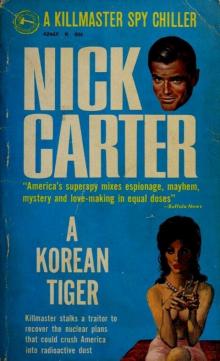 A Korean Tiger
A Korean Tiger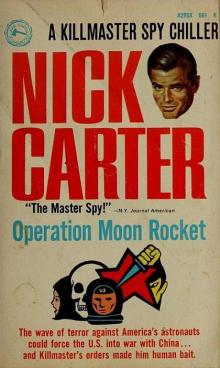 Operation Moon Rocket
Operation Moon Rocket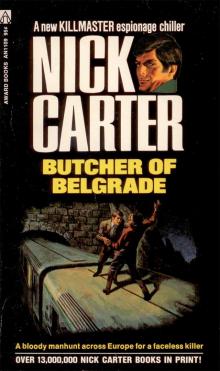 Butcher of Belgrade
Butcher of Belgrade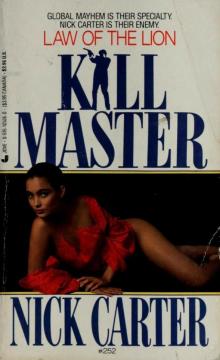 Law of the Lion
Law of the Lion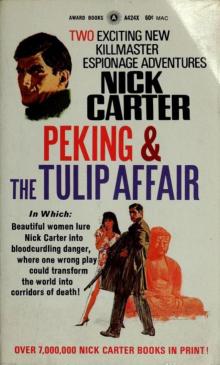 Peking & The Tulip Affair
Peking & The Tulip Affair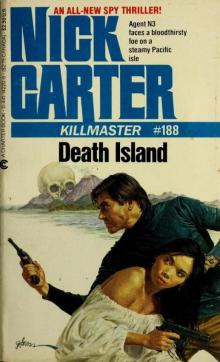 Death Island
Death Island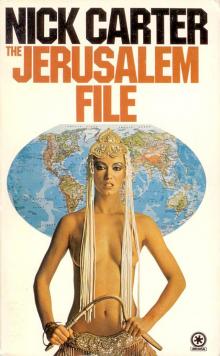 The Jerusalem File
The Jerusalem File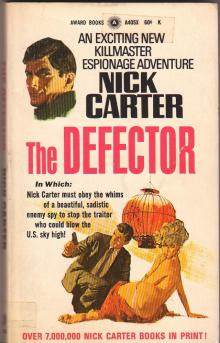 The Defector
The Defector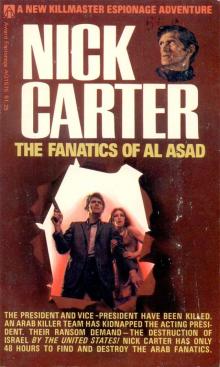 The Fanatics of Al Asad
The Fanatics of Al Asad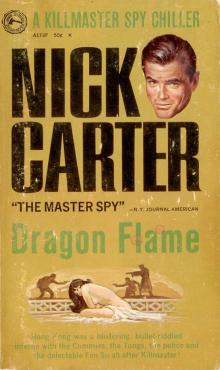 Dragon Flame
Dragon Flame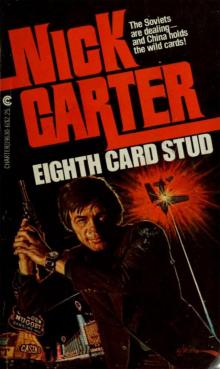 Eighth Card Stud
Eighth Card Stud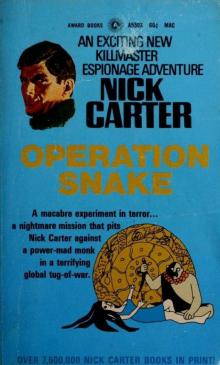 Operation Snake
Operation Snake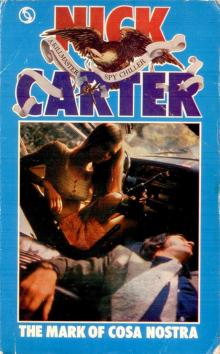 The Mark of Cosa Nostra
The Mark of Cosa Nostra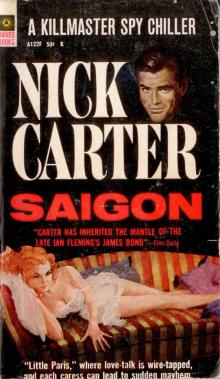 Saigon
Saigon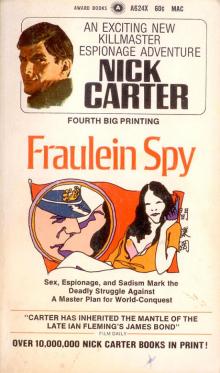 Fraulein Spy
Fraulein Spy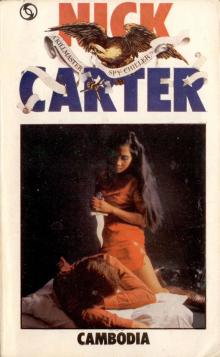 Cambodia
Cambodia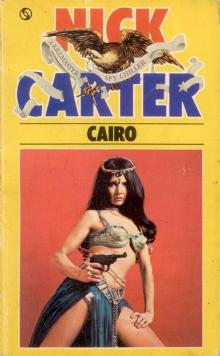 Cairo
Cairo